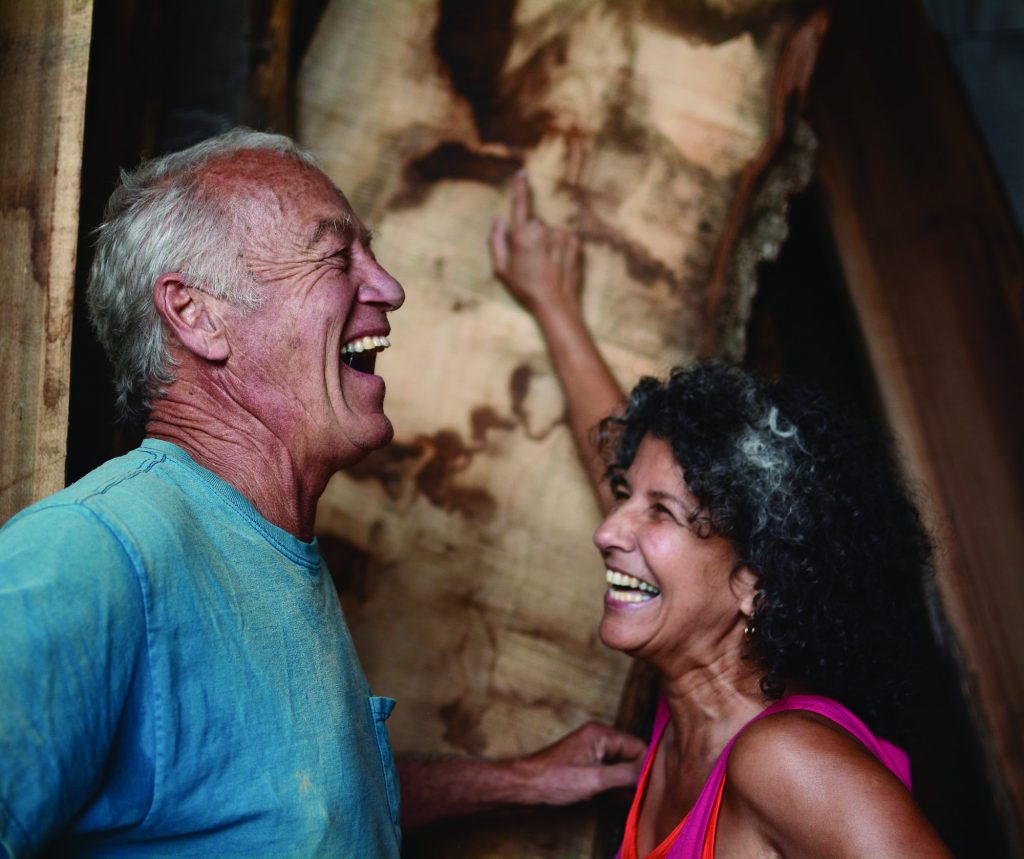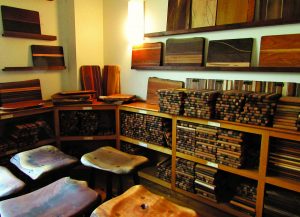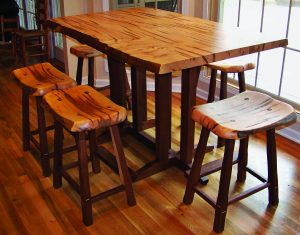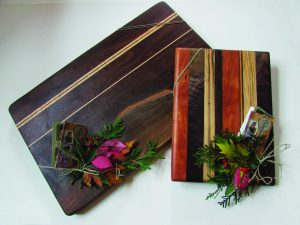
by Karl H. Kazaks
Late one morning, Corinne Graefe walked through an outbuilding that is part of Phoenix Hardwoods; the fine furniture business that she and her husband, Bill, operate in Floyd. In the warm shadowy light, she examined slabs of various hardwood species, including rare specimens of walnut root and burled poplar; imagining what the rough-cut lumber would become one day – a table, a stool, or a headboard perhaps.
“This is what happens when your addiction is wood,” she explains. What happens when you possess a Phoenix Hardwoods creation is you become the caretaker for a piece of wood furniture which contains an undeniable, natural sense of grace. No matter how large or small, the Graefe’s furniture pieces all exhibit thoughtful design and craftsmanship.
 Phoenix Hardwoods’ products exhibit a clear, practical utility, as well as an obvious connection to the original tree and a genuine beauty. Take, for example, a stool with a seat that shows the warm hue and chatoyant gleam of butternut. Or a table with a top and legs made from the same piece of curly maple; featuring an entrancing, rippling figuring, as well as a live edge. Or even a headboard in which the original shape and coloration of a thick walnut slab is captured in a Shaker-style frame. “It still looks like the tree,” Bill says.
Phoenix Hardwoods’ products exhibit a clear, practical utility, as well as an obvious connection to the original tree and a genuine beauty. Take, for example, a stool with a seat that shows the warm hue and chatoyant gleam of butternut. Or a table with a top and legs made from the same piece of curly maple; featuring an entrancing, rippling figuring, as well as a live edge. Or even a headboard in which the original shape and coloration of a thick walnut slab is captured in a Shaker-style frame. “It still looks like the tree,” Bill says.
Customers especially like the Graefe’s live-edge products, whether it be a table, a floating shelf, a box, or a vase. “People love it because it’s real,” Corinne exclaims.
The business began in 2002, a few years after the Graefes opened a custom lumber operation built around a sawmill and a wood-drying kiln. The couple still use the mill and kiln, largely to supply wood for their furniture business. But the kiln, it should be noted, is only the last step in their slab-drying process. The first step is to dry the hardwood outdoors, a year for each inch of thickness. That means a three-year drying period for a three-inch slab.
 That level of dedication to making sure everything is just right can also be found on Phoenix Hardwoods’ shop floor, where, in addition to Bill and Corinne, four full-time employees build furniture by hand. To be sure, they use power tools, but the machines are hand-controlled, not computer-operated, and no detail is overlooked. For example, the stools use wedged mortise and tenon joints to connect each seat to its legs. This joinery technique involves hand rasping the opening of the mortise (in the seat) to create a wider opening, which allows for the insertion of a wedge into the end of the tenon (the top of the legs). The result is a much stronger joint.
That level of dedication to making sure everything is just right can also be found on Phoenix Hardwoods’ shop floor, where, in addition to Bill and Corinne, four full-time employees build furniture by hand. To be sure, they use power tools, but the machines are hand-controlled, not computer-operated, and no detail is overlooked. For example, the stools use wedged mortise and tenon joints to connect each seat to its legs. This joinery technique involves hand rasping the opening of the mortise (in the seat) to create a wider opening, which allows for the insertion of a wedge into the end of the tenon (the top of the legs). The result is a much stronger joint.
 Walk into the shop one day, and you may see Henry Vangunten working on his original new design; a table with a floating top. Beside him, Eric McDaniel may be gluing and clamping stool legs, then setting them aside to dry for a day. Caleb Johnson, who has been with Phoenix for over fifteen years, will be coming up with unique ways to use the unusual scraps of highly figured lumber.
Walk into the shop one day, and you may see Henry Vangunten working on his original new design; a table with a floating top. Beside him, Eric McDaniel may be gluing and clamping stool legs, then setting them aside to dry for a day. Caleb Johnson, who has been with Phoenix for over fifteen years, will be coming up with unique ways to use the unusual scraps of highly figured lumber.
“I get the greatest job satisfaction here out of any job I’ve had,” says McDaniel. “You actually get to see the end product and be proud of what you’ve done.”
Bradley Lawson agrees. “I enjoy bringing to life something that could outlive me.” Lawson crafts beds and tables and does much of the finishing work.
 The Graefes mostly use a linseed oil-citrus solvent finish; applying a minimum of three coats and burnishing between coats. The tables are mostly finished with a dull, waterproof varnish. Preparing and finishing a burl live-edge piece is incredibly time-consuming, but it’s the kind of work which brings Corinne satisfaction. “I’ve always been interested in woodworking,” she relates. “I was the first girl in my shop class.”
The Graefes mostly use a linseed oil-citrus solvent finish; applying a minimum of three coats and burnishing between coats. The tables are mostly finished with a dull, waterproof varnish. Preparing and finishing a burl live-edge piece is incredibly time-consuming, but it’s the kind of work which brings Corinne satisfaction. “I’ve always been interested in woodworking,” she relates. “I was the first girl in my shop class.”
“She’s very particular…” Bill added.
In describing how the couple partition their duties, Corinne explains, “You’ll be more likely to see Bill with a chain saw and me with a chisel.”
 Phoenix Hardwoods is particularly known for its larger pieces. Bill loves working with five-foot wide logs. They are also famous for being featured in the rooms and lobby of Hotel Floyd. The company uses mainly hardwoods native to New River Valley forests, but they will also work with hardwoods recovered from planted species. “Arborists bring us all kinds of amazing logs,” they say.
Phoenix Hardwoods is particularly known for its larger pieces. Bill loves working with five-foot wide logs. They are also famous for being featured in the rooms and lobby of Hotel Floyd. The company uses mainly hardwoods native to New River Valley forests, but they will also work with hardwoods recovered from planted species. “Arborists bring us all kinds of amazing logs,” they say.
In the hands of the Graefes, lumber that may have otherwise vanished in ash and smoke as firewood is harvested and given a new life; one which honors and illuminates the life that came before it in the shape and character of the original tree.
Phoenix Hardwoods is located at 2540 Floyd Hwy. N. in Floyd, Virginia. For more information, follow Phoenix Hardwoods on Facebook, visit online at www.phoenix-hardwoods.com, or call (540) 745-6403.

Phoenix Hardwoods • (540) 745-6403 • 2540 Floyd Hwy. N., Floyd, VA
www.phoenix-hardwoods.com • facebook.com/PhoenixHardwoods/
